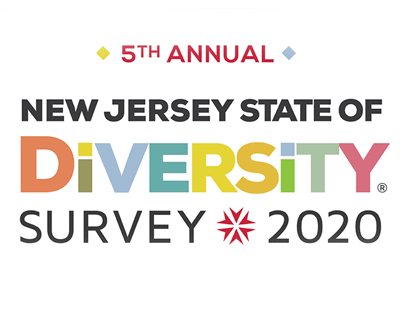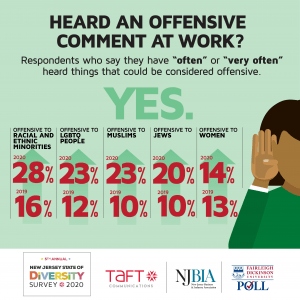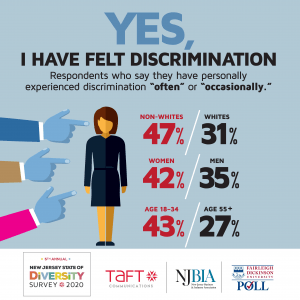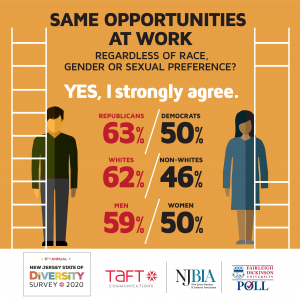
Survey shows young NJ workers far more concerned about racial issues in workplace than older colleagues
Offensive comments in workplaces at 5-year highs
LAWRENCEVILLE, NJ (July 30, 2020) — Marked generational differences in attitudes and experiences around race, religion, and ethnicity in New Jersey’s workplaces are key findings in the fifth annual New Jersey State of Diversity® Survey, commissioned by Taft Communications and the New Jersey Business & Industry Association (NJBIA).
In addition, significant differences based on political party identification and race showed up in the responses to many survey questions.
A pronounced — if disturbing — trend in the poll results involves the extent to which people report hearing comments in the workplace that could be seen as offensive to racial and ethnic minorities; women; Muslims; Jews; and those who are lesbian, gay, bisexual, transgender, and queer or questioning.
Click to Tweet: Marked generational differences on race, religion and ethnicity highlight of new @FDUPoll survey from @NJBIA & @TaftComms. Read the full survey results here: www.taftcommunications.com/diversity #diversity
Those polled are asked each year: “Over the past year, have you overheard things at work that might be considered offensive to certain groups?” Then they are asked how often they “hear things that could be considered offensive to” people in the five categories. The share of those polled who said they hear such comments “very often” or “occasionally” for each group was at the highest levels in 2020 since the Taft poll started in 2016.
- 28% said they “very often” or ”occasionally” hear things that could be considered offensive to racial and ethnic minorities, compared to 16% last year and 19% in 2016.
- 24% said they “very often” or “occasionally” hear things that could be considered offensive to women, compared to 14% last year and 13% in 2016.
- 23% said they “very often” or “occasionally” hear things that could be considered offensive to LGBTQ people, compared to 12% last year and 16% in 2016.
- 23% said they “very often” or “occasionally” hear things that could be considered offensive to Muslims, compared to 10% last year and 19% in 2016.
- 20% said they “very often” or “occasionally” hear things that could be considered offensive to Jews, compared to 10% last year and 9% in 2016.
Sharp differences surfaced on all of these questions by age and political affiliation. For example, 43% of people age 18-34 said they “very often” or “occasionally” hear things that could be considered offensive to racial and ethnic minorities, compared to 17% of those age 55 and older; 36% of Democrats said they “very often” or “occasionally” hear things that could be considered offensive to racial and ethnic minorities, compared to 21% of Republicans;
And, 35% of non-whites said they “very often” or “occasionally” hear things that could be considered offensive to racial and ethnic minorities, compared to 22% of whites.
Since 2016, Taft has polled New Jerseyans to gain insights into the day-to-day reality of and public attitudes toward diversity in the state. This year’s poll was developed in conjunction with the NJBIA and conducted by the Fairleigh Dickinson University Poll. The survey, fielded from June 18 to 29, is based on the responses of 506 randomly selected working adults in New Jersey.
Full 2020 poll results are available here. You can also view the results of the Taft New Jersey State of Diversity surveys from 2019, 2018, 2017 and 2016.
“Taft’s fifth annual diversity poll took place against a background of renewed and overdue focus on issues of race and racial justice facing New Jersey, the nation, and the world,” said Taft President Ted Deutsch. “The findings offer some hope, especially in the responses of the youngest New Jerseyans. Their sensitivity to their surroundings and the feelings of others is encouraging. Yet the increased reports of offensive remarks and a sense among nearly half of non-whites that they have felt discrimination at least occasionally is a sobering reality check.”
“This continues to be a very profound moment in our nation’s history as it relates to racial and gender inequities,” said Michele Siekerka, president and CEO of the New Jersey Business & Industry Association. “The timely results of this year’s survey further justify the need to take full stock of our words and actions if we truly want to effectuate meaningful change in the workplace.
“Businesses can also facilitate solutions by enabling an open discourse among their workforce that lends itself to a better understanding of sensitivities, a broadening of perspectives and evolving education.”
“The partisan differences that we observed, particularly in relation to reported instances of offensive comments in the workplace, are worth noting,” said Krista Jenkins, director of the poll and a professor of politics and government at FDU. “By and large, Republicans were less likely than Democrats to report hearing things that some would find offensive to women and minority groups. This could be a reflection of the parties operating as a prism through which people evaluate workplace banter. Regardless, these differences mark yet another way that political party differences are increasingly seen in regard to seemingly apolitical issues and behaviors.”
Beyond the core questions the poll has asked for five years, Taft and NJBIA added a number of new questions to look more directly at issues of discrimination and employer response.
Significant differences showed up by gender and race when those polled were asked, “Have you personally felt or experienced discrimination based on race, gender, religion, or sexual preference?” Those who answered “yes” were asked, “Would you say ‘often’ or ‘occasionally?’ ”
Nearly half of non-white respondents (47%) said they have personally felt discrimination “often” or “occasionally,” compared to 31% of whites. Such feelings were more pronounced among women than men: 42% of women said they felt discrimination “often” or “occasionally,” compared to 35% of men. Here, too, the youngest people surveyed reported experiencing more discrimination based on race, gender, religion, or sexual preference: 43% of those age 18-34 said they experienced discrimination “often” or “occasionally,” compared to 27% of those 55 and older.
Though 55% of those surveyed said some of the most senior leaders where they work are people of color and 54% said they “strongly agree” that “the opportunities in your workplace are similar for employees regardless of race, gender, or sexual preference,” the same splits that appeared elsewhere were pronounced on the issue of opportunity. Republicans were more likely than Democrats to “strongly agree” that opportunities are similar, 63% versus 50%; whites more likely than non-whites, 62% versus 46%; and men more likely than women, 59% versus 50%.
Nearly a quarter of respondents said they personally worry about race relations in the workplace “a lot” or “sometimes” (23%), again with sharp divergence among various categories, including 35% of those 18-34 compared to 12% of those 55 and older; and 27% of Democrats compared to 15% of Republicans.
People were much more likely to personally worry about race relations in their local community (44%) “a lot” or “sometimes,” including 51% of those age 18-34 compared to 36% of those 55 and older; and 53% of Democrats, compared to 33% of Republicans.
Click to Tweet: Marked generational differences on race, religion and ethnicity highlight of new @FDUPoll survey from @NJBIA & @TaftComms. Read the full survey results here: taftcommunications.com/diversity #diversity
Methodology
This survey was conducted by the Fairleigh Dickinson University Poll. Respondents were randomly contacted via cellular and landline telephones June 18-29, 2020, and those who indicated full-time or part-time employment were asked the questions highlighted in this release. Results have a margin of sampling error of +/- 5.2 points, including the design effect, for the 506 respondents included in this study.





